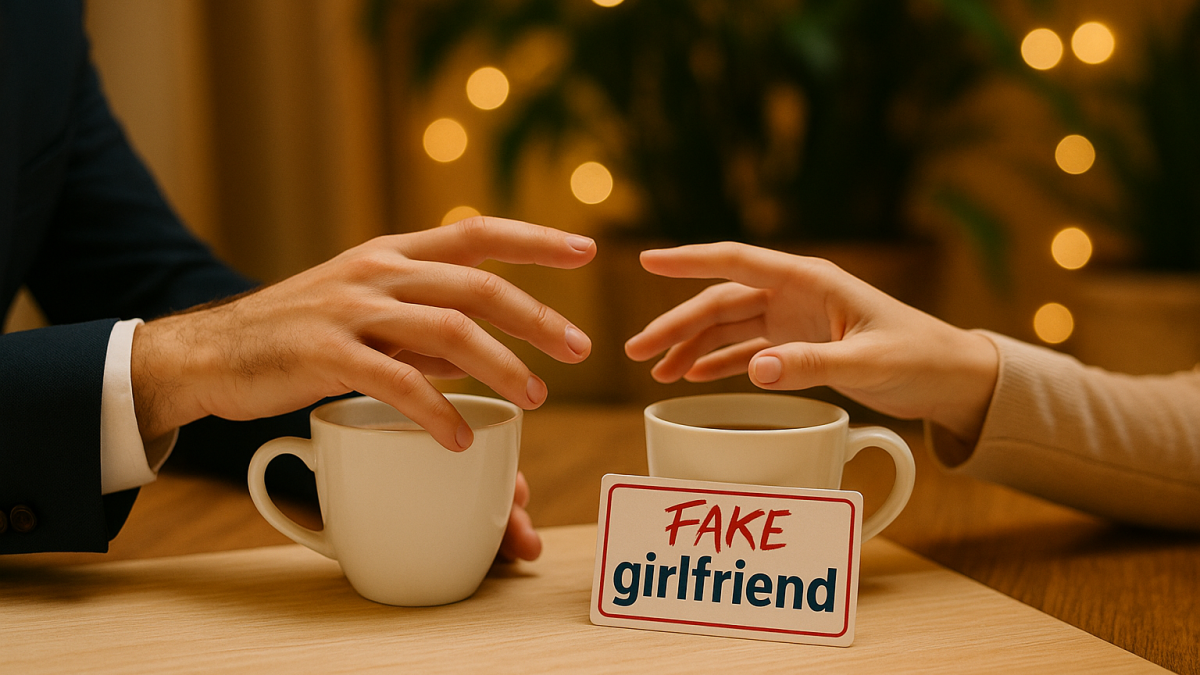
Let’s talk about one of my absolute favorite romance tropes: the fake relationship.
You know the setup. Two people agree to pretend they’re together—maybe to make an ex jealous, fool their families, secure a business deal, or get someone off their back. It’s supposed to be temporary. No real feelings involved. Just acting.
Except… we all know how that turns out.
Why We Can’t Get Enough of This Trope
There’s something irresistible about watching two people fake their way into real feelings. Maybe it’s because the fake relationship trope gives us everything we love about romance:
(If you want to dive deeper into why this trope works so well, I wrote a whole post about the truth about fake relationships):
The slow burn. They can’t just jump into bed (well, they could, but that would complicate the “fake” part). Instead, we get to watch tension build as they navigate holding hands in public, sharing meaningful glances, and pretending to be in love while trying desperately not to actually fall.
The forced proximity. Fake relationships mean spending time together. Lots of it. Family dinners. Work events. Weekend getaways. And all that time together? It creates opportunities for real connection to develop beneath the surface of the act.
The emotional safety. Here’s the thing about fake relationships—they come with built-in emotional training wheels. Both characters can explore their feelings without the immediate risk of rejection because, technically, they’re just playing a part. It’s safer. Until it’s not.
What Makes a Fake Relationship Story Work
Not all fake relationship romances are created equal. The best ones understand a fundamental truth: the “fake” part is just the setup. What matters is what happens when the lines start to blur.
The stakes have to be real. Why are these characters agreeing to this arrangement? The reason needs to matter. Maybe one needs to save face at a reunion. Maybe the other needs to convince their family they’ve moved on. Whatever it is, the motivation has to feel genuine.
The chemistry has to be undeniable. We need to believe these two people could actually fool everyone around them. That means the attraction—even if they’re both fighting it—needs to crackle on the page from the start.
The unraveling has to hurt. When feelings get real and someone realizes they’re in deeper than they planned? That moment of vulnerability, of recognizing you’re no longer pretending? That’s where the magic happens.
Why This Trope Resonates
I think fake relationship stories work because they mirror something true about how real relationships often develop. We don’t always fall in love at first sight. Sometimes we start as friends. Sometimes we’re thrown together by circumstances. Sometimes we spend time with someone and gradually realize: wait, this isn’t just friendship anymore.
The fake relationship trope takes that gradual realization and puts it under a microscope. It forces characters to examine their feelings, to question what’s real and what’s performance. And in doing that, it asks us as readers to think about our own relationships—how they started, how they grew, and what makes them real.
My Take on Writing Fake Relationships
When I write a fake relationship story, I’m always asking: what makes this feel authentic? Because here’s the irony—for a story about faking it to work, everything else has to feel incredibly real.
The characters need real reasons for agreeing to the charade. Real fears about what happens if they fall for each other. Real consequences when the truth comes out. And real growth as they navigate the messy space between pretending and being genuine.
In my novella The Billionaire’s Fake Girlfriend, I wanted to explore what happens when two people enter a fake relationship thinking they can control the outcome—and then discover feelings don’t follow the rules they set. Because that’s the truth about fake relationships in romance: you can’t fake your way out of real feelings.
The Bottom Line
Fake relationship stories work because they’re about more than just the trope. They’re about two people discovering that what started as pretend has become the most real thing in their lives. They’re about taking off the masks we wear and risking being seen for who we really are.
And isn’t that what all great love stories are about?
What about you? Do you love fake relationship romances? What’s your favorite part of this trope? Want more romance trope discussions? Drop me an email at info@teigenkane.com or join my Romance Subscribers list below for updates on new releases, behind-the-scenes writing insights, and exclusive content you won’t find anywhere else—I’d love to hear what draws you to these stories.
